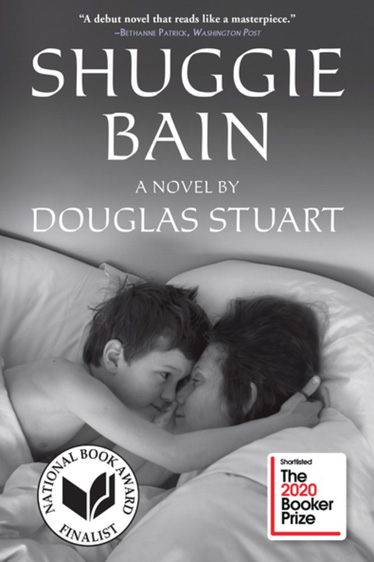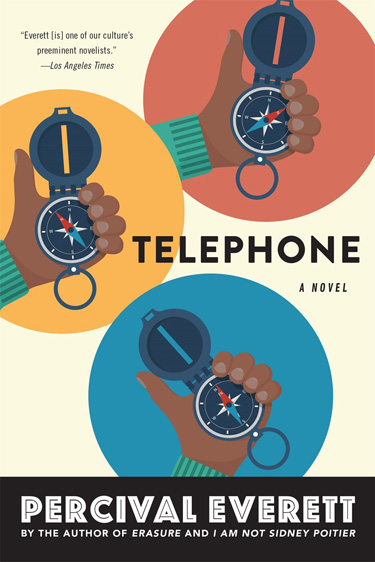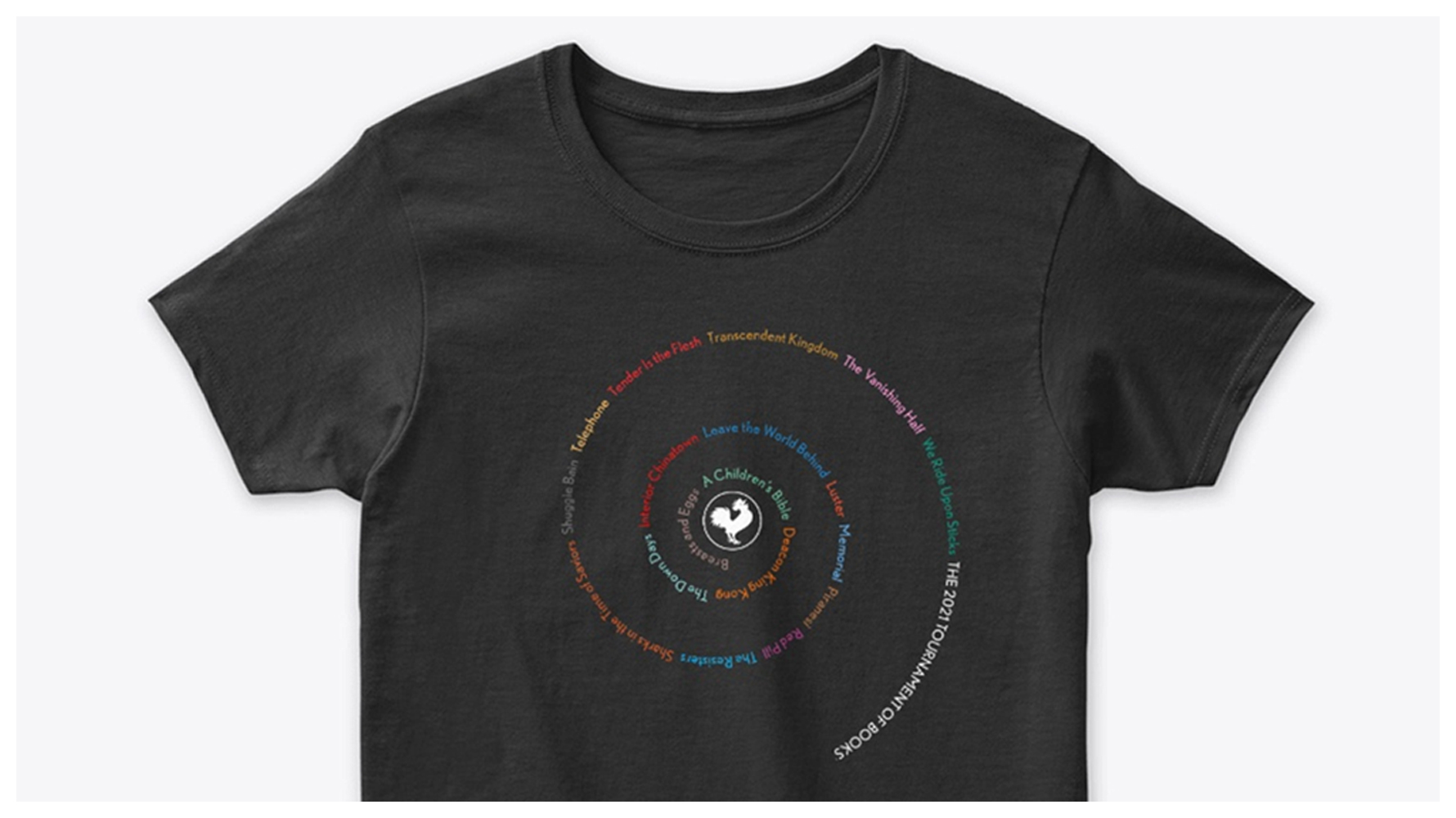-
March 15, 2021
Opening Round
-
Douglas Stuart
1Shuggie Bain
v.
4TelephonePercival Everett
-
Judged by
Rachelle Hampton
It has to be said that writing this judgment sent me into a minor existential crisis. Questions that had absolutely nothing to do with my personal opinion on Percival Everett’s Telephone or Douglas Stuart’s Shuggie Bain paralyzed me as I read them. What would this more established critic think? What are the reviews saying? Which judgment will make people the least mad at me? And who exactly gave me the right to choose between the latest book in Everett’s storied career or the winner of the 2020 Booker Prize? I came to a resolution eventually—clearly. Like most decisions made by twentysomethings, it ultimately came down to external validation: If the good folks at the Tournament of Books chose me then there had to be a reason, and that reason had to be good enough for me.
I made my decision based on a maxim that has largely ruled my cultural consumption for the past 20-odd years: Do I want to reread this? Repetition gets a bad rep but there’s something to be said for voluntarily returning to a text for comfort or deeper understanding. Those are, to my mind, the two main modes of rereading. Each mode places different demands on a text. Rereading Philippa Gregory’s The Other Boleyn Girl is not the same as rereading Alexander Chee’s How to Write an Autobiographical Novel. The joy of the comfort reread is in no way diminished if the book isn’t as good as the first time you read it (though it’s always better if it is). The primary appeal is nostalgia, a return to a specific place and time where you first read the book.
The other mode of rereading benefits from coming to the book in a different stage of life than the one you first encountered it in. The first read is often accompanied by the persistent feeling that you don’t quite understand everything that the author is doing, but that one day you might. The possibility of understanding has to be there, though; needlessly abstruse texts are more likely to be abandoned halfway through than reread. Painful books aren’t precluded from either mode of rereading, though each requires the pain to function differently. The pain in a comfort reread has to be cathartic; the pain in the clarifying reread has to feel as if it’s doing more than manipulating you into tears.
And if there’s anything that Shuggie Bain delivers on, it’s pain.
Douglas Stuart’s debut novel is an evocative portrait of the relationship between the titular Hugh “Shuggie” Bain and his beautiful disaster of a mother, Agnes, who’s an alcoholic. The novel opens with a 16-year-old Shuggie, alone in a bedsit in 1990s Glasgow, whose Thatcher-induced decline is so richly rendered you can almost smell the cigarette smoke wafting off the pages. The bulk of the story deals with how exactly Shuggie came to be on his own, though he’s ultimately auxiliary to his own story. Instead, Agnes and her years-long decline into alcoholism take center stage in a series of vivid vignettes that begin with a romantic contemplation of suicide:
How easy it would be to kid herself that she was flying, until it became only falling and she broke herself on the concrete below. The high-rise flat she still shared with her mother and father pressed in against her. Everything in the room behind her felt so small, so low-ceilinged and stifling, payday to Mass day, a life bought on tick, with nothing that ever felt owned outright.
Shuggie Bain features little plot so to speak. Instead, the inertia of Agnes’s deterioration drives the novel forward. She is subject first to the abuse and infidelity of her husband, Big Shug Bain, who moves his family from the high-rise flat to a desolate post-industrial village in an effort to cut Agnes off from her enablers. He abandons them there on moving day in an act so evil it beggars belief: Agnes “had loved him, and he needed to break her completely to leave her for good… It wouldn’t do to leave pieces of her for another man to collect and repair later.” Shug’s departure isn’t the catalyst for Agnes’s ruin, but it certainly accelerates it; the loss of his income leaves her vulnerable to increasingly predatory men as she drinks through the family’s weekly benefits money too quickly. His departure, or at least the way it’s described, neatly sums up the primary issue of Shuggie Bain.
There’s a full range of Note Books and related stationery products at fieldnotesbrand.com. Field Notes is proud to once again be a sponsor of the Tournament of Books.
The shifting third-person narrator that allows the reader to know what Shug is thinking as he abandons his family also never really allows us to get close enough to any of the characters, to get beneath their skin. Shuggie is described often as “a wary ghost” or a “quiet shadow” and that’s about how much space he takes up in the book. He seems to primarily function as a witness to the burning cipher that is his mother, observing her immolation in prose that at times borders on too precocious. As a five-year-old, he describes his mother as looking “like the lager beauties sometimes did, a careless printer and a misaligned screen and suddenly the woman was no longer whole, just a mess of different layers.” And though Agnes is a reverently drawn portrait, sympathetic even at her worst, that is all she really is—a portrait, a version of a person translated and transmuted through someone else’s eyes.
Before I finished Shuggie Bain I felt as if I understood, perhaps too clearly, everything it had to say. There’s little that’s not shown or outright told to us, albeit in lovely, gutting prose. Whatever questions I had by the final page—who Agnes was outside of the men who exploited her, who Shuggie would become without his mother—wouldn’t be answered by another look.
Telephone similarly deals with the idea of playing helpless witness to a decline, though by the end of the novel we are intimately acquainted with the particular idiosyncratic tics of Everett’s narrator. There are three separate versions of Telephone floating around, all with different endings. The only way to know which version you’ve got in your hand is to read its sisters, or to spot the minor differences in cover design. The gambit was initially designed to be a secret, slowly discovered through word of mouth, but the pandemic prompted Everett to move up the reveal. The title, referring to the game where messages are passed and distorted around a circle, is a reference to both the gambit and to the questions that Telephone raises.
On its face, Telephone is one part campus novel, one part thriller, and one part tragedy. Zach Wells is an unexceptional and unhappy geologist and paleontologist; he is carried along by the current of his life until his beloved daughter is diagnosed with a terminal illness. When he finds a note that says ayúdame (“help me”) tucked into a jacket he’s ordered online, he sets off to find the person in need, desperate to exert some kind of control as his daughter slips away from him. Zach’s ill-advised rescue mission is largely tucked into the last third of the book. The rest of it deals with his grief as his daughter’s illness progresses to a point where she no longer recognizes him. I can only imagine how hard this would be to read as a parent. Zach’s love for his daughter, made more poignant by his utter detachment to everything else around him, made my chest ache. He describes one of the seizures caused by her illness as “small destructions and I withered alongside her each and every time.”
Mere seconds. Infinite seconds. I felt bad, guilty even, for feeling a perverse happiness at having witnessed the seizure alone. I wanted all of my daughter that I could get, and I wanted her selfishly. I wanted to cache moments and freeze them for parceling out over the balance of my so-called life.
Telephone is concerned primarily with inevitability and choice, and the fine lines that separate them. It’s concerned with questions of epistemology—whether knowledge can change an outcome or at least the interpretation of it. The three endings aren’t the only trick that Everett uses to raise these questions. Paragraphs and vignettes are separated by interstitial and seemingly random information: chess moves; bits of Latin; descriptions of art in the Louvre; the phrase, “It was hotter in New Mexico.” It’s largely up to the reader to decide how, or if, these affect the story. It seems unfair that the book also manages to be darkly funny.
Still, outside the bare facts of the plot, Telephone is tough to describe. So much of it is left up to us to decode, and Everett seems more than willing to challenge his reader, to leave us with no cathartic certainty. The separate versions preclude any sort of definitive take and seem designed to leave readers somewhat unsatisfied. It’s funny then that I found Telephone a more gratifying read than Shuggie Bain, though I think I understood less of it. Shuggie Bain is exquisitely written, but there’s little lingering beneath the surface besides heartbreak; experiencing it once is more than enough. And though Telephone is by no means a happy story, I found myself thinking about it as soon as I finished, wondering what I would discover on the next read, how reading more of Everett’s oeuvre or even the other two versions of the book might change my opinion, what new interpretation might open itself up before my eyes in five, 10, 15 years.
Match Commentary
By Kevin Guilfoile & John Warner
Kevin Guilfoile: Judge Hampton says, “I can only imagine how hard [Telephone] would be to read as a parent.” And indeed, there are very few novels I’ve read in recent years that gutted me the way Telephone did. Not only is it the story of parents coping with a dying child, but they make the decision not to tell their daughter that she is dying. There is both a logic and mercy to this in the story, but as a parent it is excruciating. In fact, my wife saw it on the kitchen table one evening and asked, “Is this good?” I said, “It’s great. You can’t read it.”
But, of course, as Judge Hampton also points out, that is not all this story is. Unable to save his daughter, Zach goes searching for someone he can save, and so the ailing child story gives way to an adventure plot, which I found very satisfying in my version (which, we have already determined, is the same version you have, John). I went through a lot reading this novel, in the best way.
John Warner: I’m on record as saying that Percival Everett is our greatest living novelist, and for me, Telephone is one of his best. The nature of the daughter’s disease and the decision not to tell her is poignant and terrifying. The way Zach’s grief takes shape as barely sublimated anger, which transforms into an objectively foolish act that is also a gesture of tremendous hope, creates a swirl of emotions in the reader.
I think Everett’s books are deliciously unsettling. He traffics in recognizable themes, but he also never lets the reader get too comfortable. As Judge Hampton notes, Telephone is a combination campus novel, thriller, and tragedy, but it’s also none of those things.
I feel like we need to set up a book exchange in the comments for people who might want to read one of the alternate versions. I’ve got a spare copy of the version with the red wedge in the colophon on the spine if anyone wants to trade.
Kevin: Judge Hampton says there is little plot in Shuggie Bain, and that’s sort of true. Certainly the ratio of plot to pages is relatively small. In fact, on page 399, fewer than 50 pages from the end, Stuart throws in this bit, which made me laugh out loud:
The driver asked Shuggie where he was going. The boy just sat there and had to think for a long time, unsure where to go now, stalling for any sign of hope.
It’s not always clear where this novel is taking you, but the trip is so enjoyable. It’s detailed and discursive, and I think you’re meant to float along on top of Stuart’s beautiful prose. When stuff does happen, it’s sometimes sudden and shocking, like an undertow that drags you down the shoreline and then dumps you back into placid waters. Getting in a taxi with Shuggie is all about the ride.
John: I started Shuggie Bain, but stopped. It’s just not the kind of book I was prepared to read at the time I tried to read it. I don’t think it’s quite A Little Life-level in terms of gut-wrenching events, but it’s in the ballpark, and I just wasn’t prepared to go there.
Kevin: Yeah, I guess I shouldn’t have used the word “placid” in reference to the events of this book, right? To be clear, I was talking about how immersive the lure of Stuart’s prose was for me. I think this would be a great book to read on a trip to Glasgow, when such things are possible again. It would be a terrific companion on a long plane ride, and Glasgow is described in such an intimate way, I could see myself happily lugging it around Scottish wynds.
Tomorrow, Susanna Clarke’s Piranesi will face off against Mieko Kawakami’s Breasts and Eggs. Beatrice Kilat will be the judgy one, and the commentary booth will feature our own Rosecrans Baldwin in conversation with Kelso McNaught of New Hampshire’s Gibson’s Bookstore.
New 2021 Tournament of Books merch is now available at the TMN Store. As a reminder, Sustaining Members receive 50 percent off everything in our store. To find out why we’re asking for your support and how you can become a Sustaining Member, please visit our Membership page. Thank you.
Welcome to the Commentariat
Population: You
To keep our comments section as inclusive as possible for the book-loving public, please follow the guidelines below. We reserve the right to delete inappropriate or abusive comments, such as ad hominem attacks. We ban users who repeatedly post inappropriate comments.
- Criticize ideas, not people. Divisiveness can be a result of debates over things we truly care about; err on the side of being generous. Let’s talk and debate and gnash our book-chewing teeth with love and respect for the Rooster community, judges, authors, commentators, and commenters alike.
- If you’re uninterested in a line of discussion from an individual user, you can privately block them within Disqus to hide their comments (though they’ll still see your posts).
- While it’s not required, you can use the Disqus <spoiler> tag to hide book details that may spoil the reading experience for others, e.g., “<spoiler>Dumbledore dies.<spoiler>”
- We all feel passionately about fiction, but “you’re an idiot if you loved/hated this book that I hated/loved” isn't an argument—it’s just rude. Take a breath.




